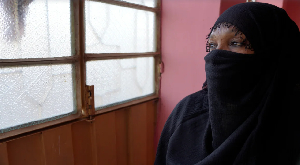Accra, July 19, GNA - Members of Parliament were on Wednesday briefed on the rudiments of national security and the work of private security operatives in Ghana in the wake of recent "targeted killings" in the country.
Professor Eboe Hutchful, Executive Director, African Security Dialogue and Research (ASDR), held that the proliferation of private security companies in the country was a factor in the growing depth of crime and related issues.
"The proliferation of the non-state security sector thus has substantial implications in terms of both challenges and opportunities for security policy and delivery," he stated at the opening of the Fourth Ghana Parliamentary Capacity-Building Workshop. The workshop, organised by ASDR in collaboration with the Parliamentary Committee on Defence and Interior and the British High Commission, was on the theme: "Understanding and Regulating Private Security in Ghana."
Prof Hutchful said there was concern that many private security Companies operating without the required licenses that the current capacity within both the Ministry of Interior and the Police Service to oversee the sector seems "fragile".
According to him, there is even less regulation of community security and vigilante groups, which had acted often with impunity to impose 'instant justice'.
"A deeper problem still is the prevailing public anti-crime culture, with its demands for tough action and tolerance for extra-judicial measures".
Prof Hutchful noted that a poorly regulated or trained Private Security Organisation could do considerable mischief and pose as potential threat to national security.
Mr Sabelo Gumedze, Senior Researcher, Defence Sector Programme, Institute for Security Studies of South Africa, described the unprecedented high number of the private security industry in Africa as a major challenge.
"Africa being a continent of perpetual suffering and forever engulfed in complex challenges from lack of development to food insecurity, to weak culture of democracy to the general absence of peace and security, there would be aggravated insecurity on the continent if private security operations are not holistically addressed." He urged the African Union and other sub-regional bodies to take a robust stand in addressing the influx of the private security sector into the continent especially in conflict zones.
Mr Gumedze suggested that an effective regulation of the private security sector with Africa's peculiar challenges must focus on the extent of the private security industry, the effect of the privatisation of security on human rights with special reference to vulnerable groups, including women and children.
Nana Adu Agyeman IV, President of the Association of Private Security Organization of Ghana (APSOG) assured the country that prospective employees of private security agencies would undergo stringent security scrutiny and be subjected to periodic checks during employment.
He called on the public and clients to alert the appropriate security authorities about any misconduct or activities of any individual and companies, which may compromise national security. The two-day workshop sought to provide a platform to the private security industry, parliamentarians, state security operatives and the media to dialogue candidly over issues affecting national security.
General News of Thursday, 19 July 2007
Source: GNA
















